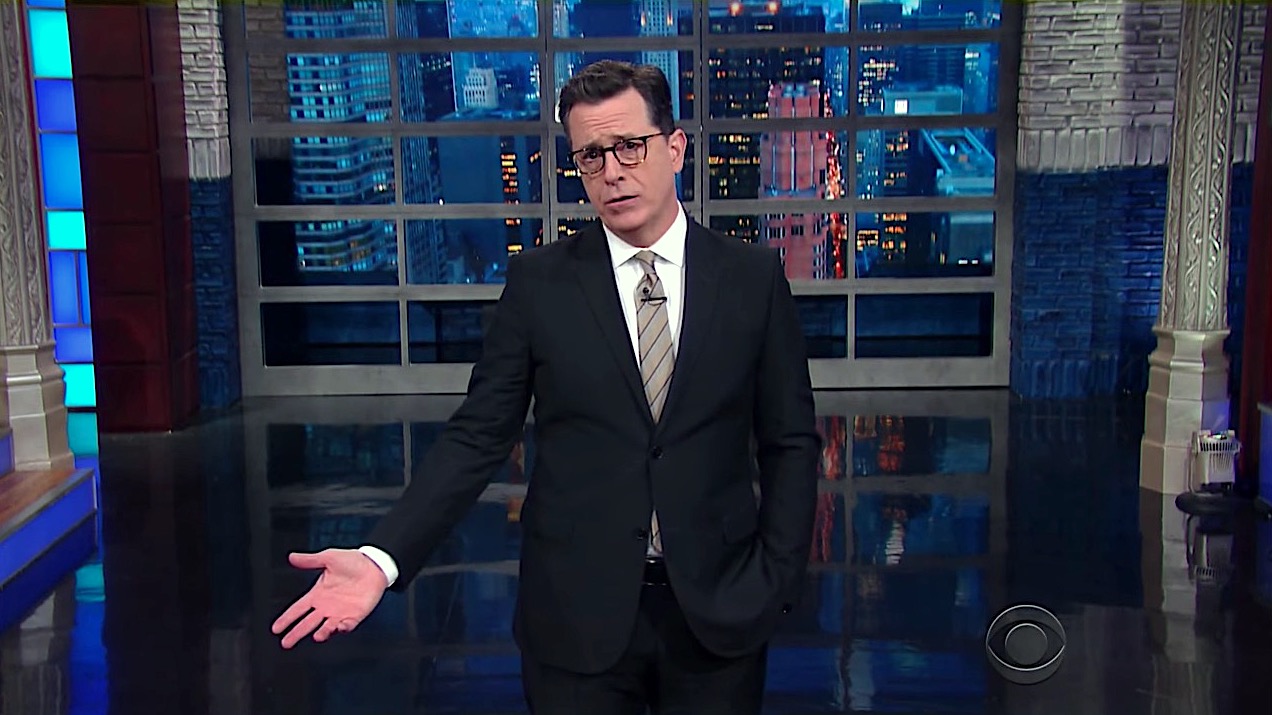Stephen Colbert wonders why Elizabeth Warren was the only senator silenced this week


A free daily email with the biggest news stories of the day – and the best features from TheWeek.com
You are now subscribed
Your newsletter sign-up was successful
The big news of the day was the Senate confirming Jeff Sessions as attorney general, Stephen Colbert said on Wednesday's Late Show, but all the real drama happened Tuesday night, when Senate Majority Leader Mitch McConnell made Sen. Elizabeth Warren sit down and be quiet, using the Senate's arcane Rule 19. "They kept her from reading a letter from Coretta Scott King," Martin Luther King Jr.'s widow, criticizing Sessions on black voting rights, he explained. "It's all part of the GOP's February message: Happy Black History Month, now shut up about the bad stuff."
"So, to recap: These days, a black person can't get their message heard even when a white person is saying it — unless that white person is a guy," Colbert said, "because this morning a bunch of white male senators were allowed to read excerpts from King's letter on the Senate floor. Of course, the men weren't silenced; that would violate Senate Rule 18: Bros before hos."
Colbert turned to the kerfuffle over Nordstrom deciding to dump Ivanka Trump's clothes and accessories. "Apparently the clothes weren't selling well, and dropping an underperforming brand is a decision any businessman would understand — except one," he said, reading Trump's Nordstrom tweet and Press Secretary Sean Spicer's defense of said tweet. "This is crazy — this is insane! You can't use the power of the office of the president to protect a family business, all right?" Colbert said. "That would be like Jimmy Carter making all of us drink Billy Beer, or that would be like George Bush invading a country that had oil — you can't do it." He ended trying to decipher another Trump tweet — "EASY D, which I think used to be Trump's rapper name back in the '80s" — and patting CNN's Jake Tapper on the back for a job well done. Watch below. Peter Weber
The Week
Escape your echo chamber. Get the facts behind the news, plus analysis from multiple perspectives.

Sign up for The Week's Free Newsletters
From our morning news briefing to a weekly Good News Newsletter, get the best of The Week delivered directly to your inbox.
From our morning news briefing to a weekly Good News Newsletter, get the best of The Week delivered directly to your inbox.
A free daily email with the biggest news stories of the day – and the best features from TheWeek.com
Peter has worked as a news and culture writer and editor at The Week since the site's launch in 2008. He covers politics, world affairs, religion and cultural currents. His journalism career began as a copy editor at a financial newswire and has included editorial positions at The New York Times Magazine, Facts on File, and Oregon State University.
-
 Political cartoons for February 16
Political cartoons for February 16Cartoons Monday’s political cartoons include President's Day, a valentine from the Epstein files, and more
-
 Regent Hong Kong: a tranquil haven with a prime waterfront spot
Regent Hong Kong: a tranquil haven with a prime waterfront spotThe Week Recommends The trendy hotel recently underwent an extensive two-year revamp
-
 The problem with diagnosing profound autism
The problem with diagnosing profound autismThe Explainer Experts are reconsidering the idea of autism as a spectrum, which could impact diagnoses and policy making for the condition
-
 TikTok secures deal to remain in US
TikTok secures deal to remain in USSpeed Read ByteDance will form a US version of the popular video-sharing platform
-
 Unemployment rate ticks up amid fall job losses
Unemployment rate ticks up amid fall job lossesSpeed Read Data released by the Commerce Department indicates ‘one of the weakest American labor markets in years’
-
 US mints final penny after 232-year run
US mints final penny after 232-year runSpeed Read Production of the one-cent coin has ended
-
 Warner Bros. explores sale amid Paramount bids
Warner Bros. explores sale amid Paramount bidsSpeed Read The media giant, home to HBO and DC Studios, has received interest from multiple buying parties
-
 Gold tops $4K per ounce, signaling financial unease
Gold tops $4K per ounce, signaling financial uneaseSpeed Read Investors are worried about President Donald Trump’s trade war
-
 Electronic Arts to go private in record $55B deal
Electronic Arts to go private in record $55B dealspeed read The video game giant is behind ‘The Sims’ and ‘Madden NFL’
-
 New York court tosses Trump's $500M fraud fine
New York court tosses Trump's $500M fraud fineSpeed Read A divided appeals court threw out a hefty penalty against President Trump for fraudulently inflating his wealth
-
 Trump said to seek government stake in Intel
Trump said to seek government stake in IntelSpeed Read The president and Intel CEO Lip-Bu Tan reportedly discussed the proposal at a recent meeting
